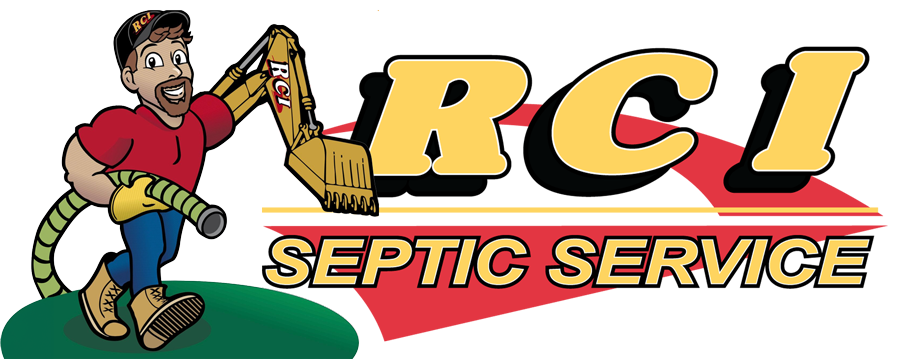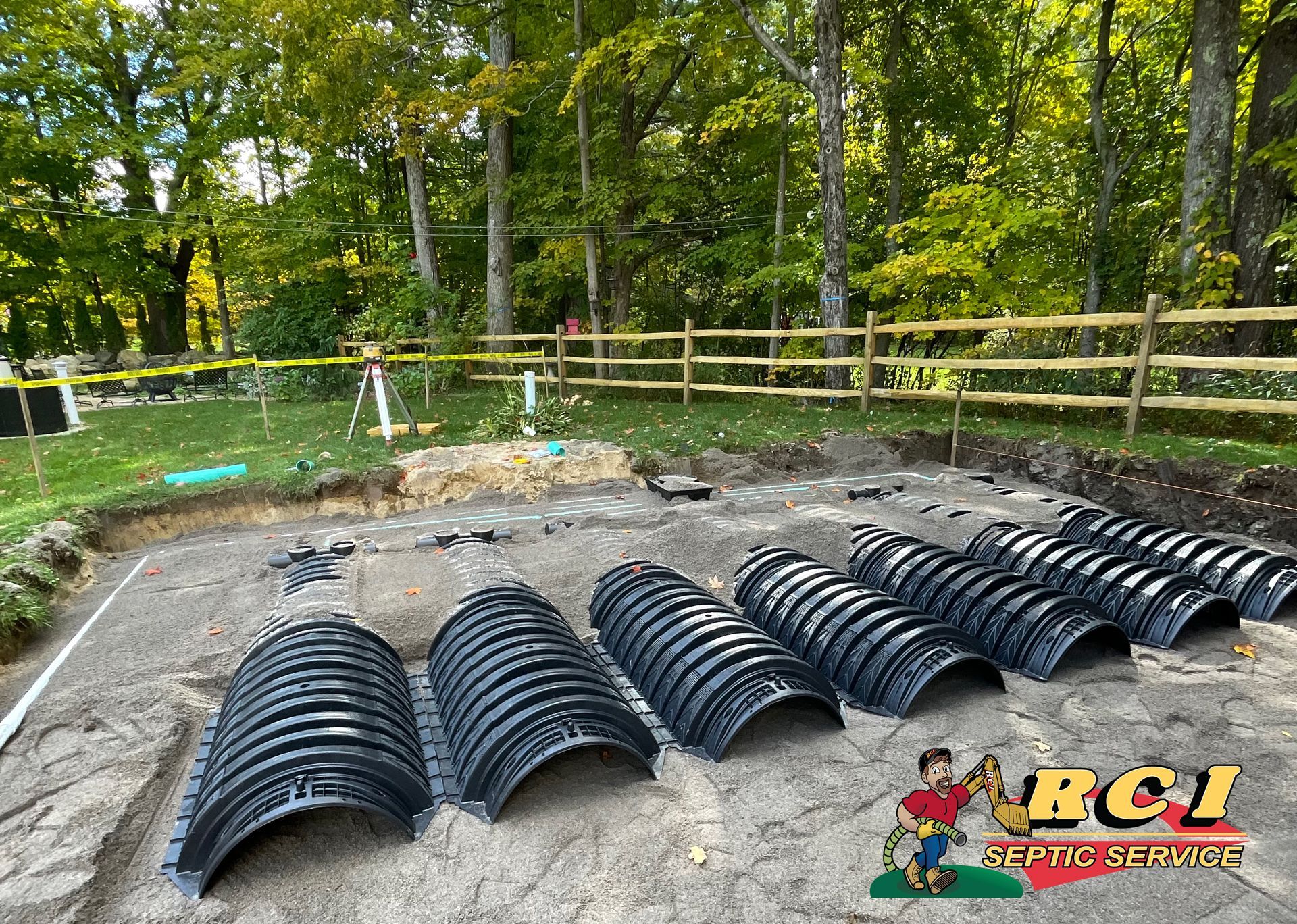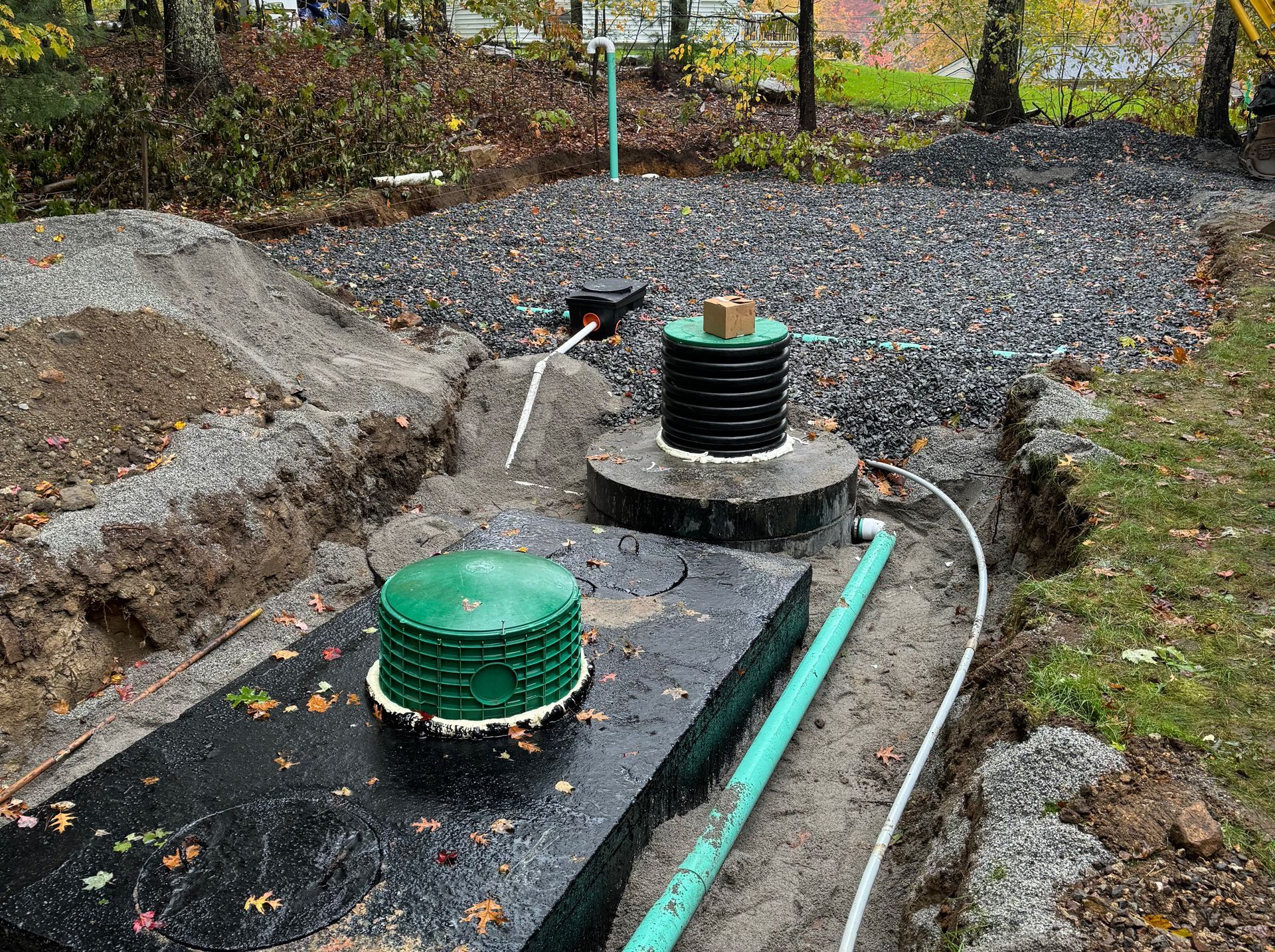How to Tell If Drain Field Is Failing: Top Warning Signs You Need to Know
Wondering how to tell if drain field is failing? Early detection can save you from expensive repairs. In this guide, you’ll learn the key symptoms to watch for, so you can address issues before they escalate.
Key Takeaways
- Persistent standing water, sewage odors, and slow drains are key indicators of a potentially failing drain field.
- Unusual plant growth, such as overly green grass or increased vegetation over the septic area, often signals septic system issues.
- Regular maintenance, including septic tank pumping and avoiding harsh chemicals, is essential for preventing drain field failures.
Introduction
Have you ever pondered the unseen herculean task of wastewater treatment beneath your feet? A properly functioning drain field plays an instrumental role in this, safeguarding public health and the environment by using soil to naturally cleanse wastewater. Yet, like all heroes, it too can falter.
Identifying the symptoms of a failing drain field is critical to averting the unpleasantness and expenses of a malfunctioning septic system. Through this narrative, we will unravel the mystery of spotting drain field distress and arm you with the knowledge to act before minor issues grow into formidable foes.
Recognizing Signs of a Failing Drain Field
The first step towards drain field vigilance is spotting the telltale signs of a septic system in jeopardy. Like a siren’s song, these signals warn of impending doom, urging immediate attention. From the discomfort of sewage odors to the despair of slow drains, each symptom whispers the possibility of a septic system surrendering to strain.
Let’s delve deeper into these warnings, and learn how to heed their call.
Persistent Standing Water
Consider the unexpected ponds that form over your drain field, not as quaint water features, but as distress signals from below. These wet areas, especially if persistent, may reveal that your plumbing system is battling a clog or the drain field is overwhelmed by excess biomat. Ignoring such signs could lead to the harsh reality of an overloaded system failing to process wastewater as intended.
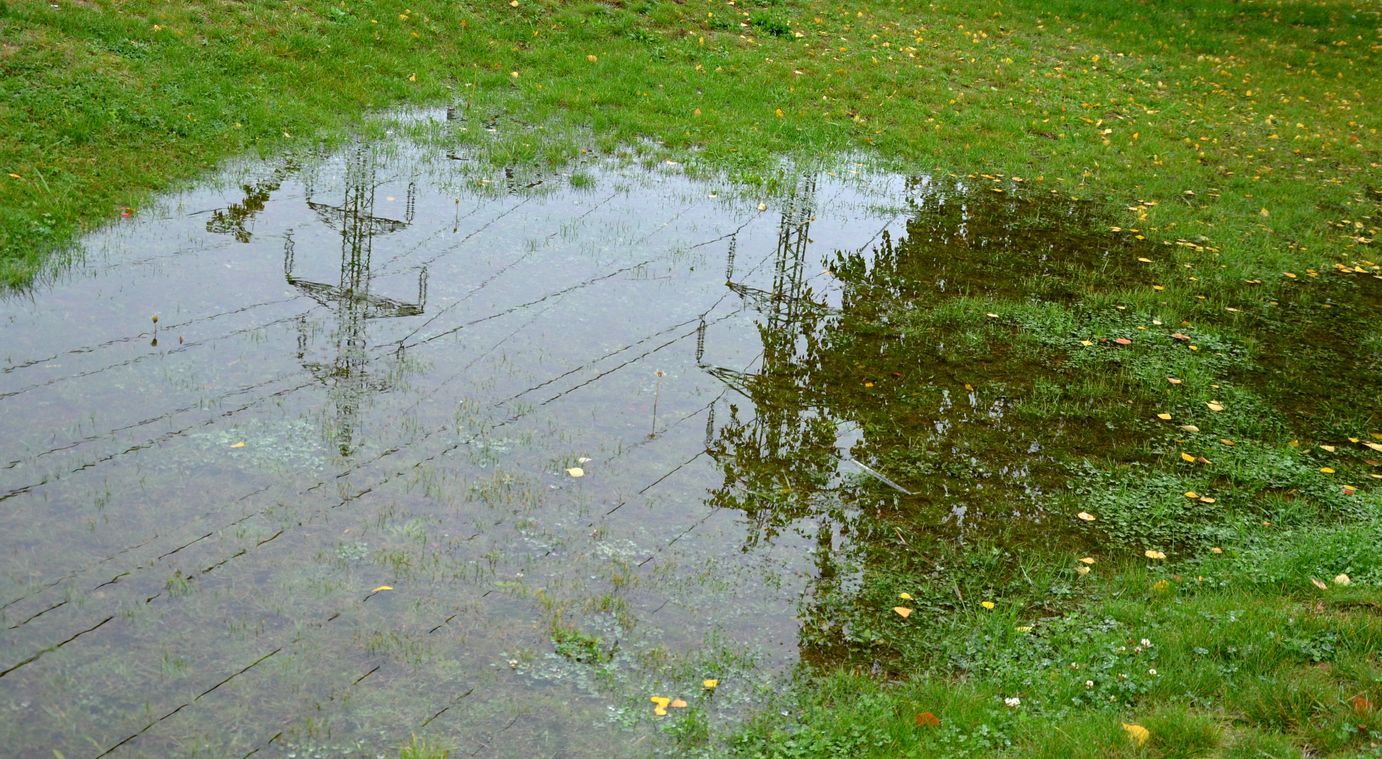
Sewage Odors
When the breeze brings with it a whiff of rotten eggs, it’s not just an unpleasant odor but an ominous signal that your septic system is under siege. The source of this malodor may lie in a blockage or a failing septic ventilation system, allowing untreated wastewater to release its fetid fragrance into your sanctuary. Such a stench is a clear call to action, one that should prompt you to seek professional intervention without delay.
Slow Drains and Backups
Imagine the frustration of experiencing the following signs of a compromised leach field:
- Water sluggishly swirling down the drain
- Backup of murky water invading your home
- Frequent clogs
- Gurgling sounds from your pipes
These are not mere inconveniences but early cries for help from your septic system. If left unchecked, these issues can escalate into a full-blown septic system rebellion.
Unusual Plant Growth
As we navigate the labyrinth of septic system health, let’s turn our gaze to the growth above. Unusual plant growth, a verdant siren amid your lawn, often signals septic secrets buried beneath. It’s the effluent, rich in nutrients, that whispers life into plants, causing them to flourish with unnatural vigor over your drain field.
The emerald patch of grass over the drain field, often mistaken for a gardener’s triumph, might actually be a testament to septic system woes. This overly green grass is a silent nod to the effluent enriching the soil beneath it, a luxurious cloak hiding a potential environmental threat.
Increased Plant Growth
Beware of the lushness that creeps over your septic area, for it could be the spawn of untreated wastewater surfacing from the depths. This increased plant growth is not a sign of horticultural prowess but a distress flare indicating that the septic system’s purifying process has been compromised.
Contaminated Surface Water
When the sanctity of surface water is breached by a failing drain field, it becomes a cauldron of contamination. Pathogens like E. coli, once imprisoned within the septic system, find their way into streams and ponds, transforming them into vectors of disease.
This is not just an environmental concern but a direct threat to public health and recreational enjoyment.
Soil Absorption Issues
The soil absorption field, a critical component in the septic system’s digestion of waste, can become compromised, leading to dire consequences. When wastewater fails to filter through the soil properly, it surfaces, bringing with it untreated contaminants and creating a public health hazard.
Causes of Drain Field Failure
While the signs of a failing leach field are distressing, understanding the underlying causes can empower homeowners to prevent such disasters. From excessive water usage to the silent invasion of roots, a myriad of factors can contribute to the untimely demise of a septic drain field.
Excessive Water Usage
An overzealous tap or a torrential downpour can spell disaster for a drain field, drowning it in more water than it can handle. This excessive water usage can saturate the drain field, leaving it gasping for breath and struggling to perform its duty of absorbing and purifying wastewater.
Root Intrusion
The unsuspecting roots of nearby flora, in their quest for moisture, can become unwitting saboteurs to the drain field’s labyrinth of pipes. As they infiltrate and expand within the pipes, they obstruct the flow of wastewater, strangling the system’s ability to function.
Lack of Regular Maintenance
The absence of regular maintenance is akin to inviting chaos into your septic system. Infrequent pumping and neglect can lead to a buildup of solids, clogging the path to the drain field and diminishing the system’s efficiency.
Preventing Drain Field Problems
Fortifying one’s septic system against failure is a crusade that requires vigilance and proactive measures. From the simple act of regular maintenance to the mindful disposal of waste, homeowners can shield their drain fields from the clutches of collapse.
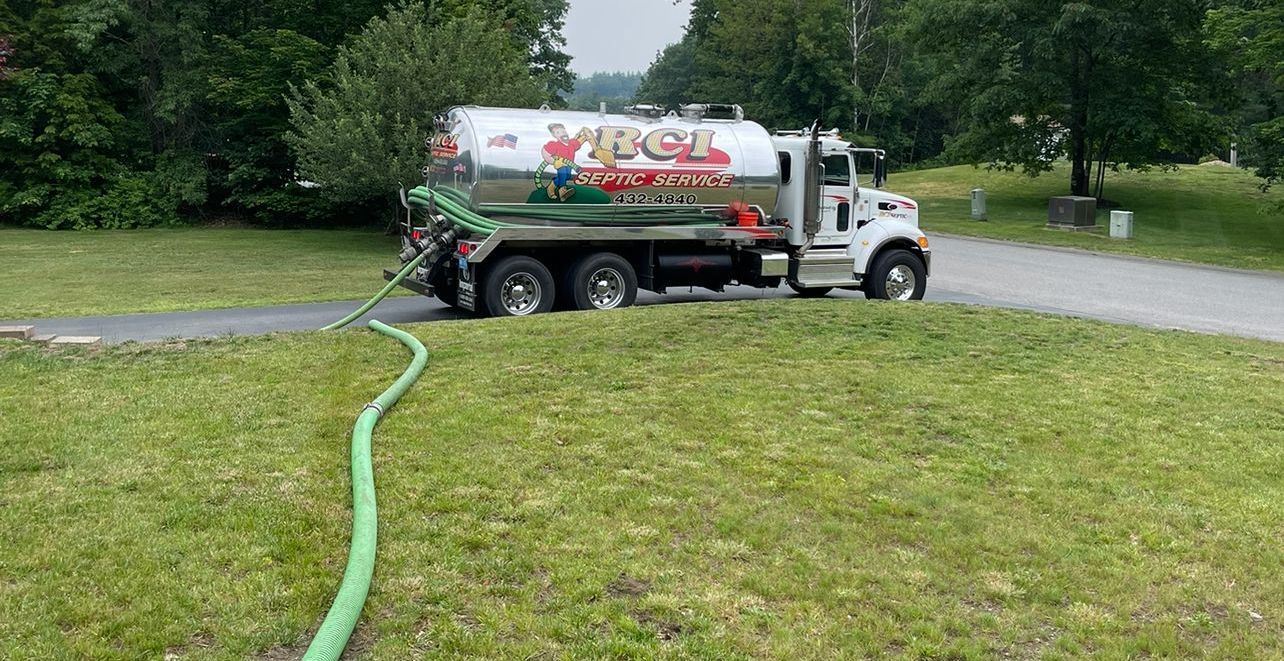
Regular Septic Tank Pumping
The ritual of getting your tank pumped, performed every few years, can extend the life of your actual septic tank and keep it running like a well-oiled machine. This preventive measure is a bulwark against backups and the silent guardian of your drain field’s well-being, ensuring the proper functioning of septic tanks.
Avoiding Harsh Chemicals
The chemicals we pour down our drains, such as chemical drain cleaners, may offer a temporary respite from clogs, but they wreak havoc on the delicate ecosystem within the septic system. Embracing biodegradable alternatives preserves the balance of bacteria and enzymes that are the lifeblood of a healthy septic system.
Proper Waste Disposal
The journey of waste, including human waste, down our drains should not be one of recklessness. By practicing proper garbage disposal, we ensure that our septic system remains a steadfast ally in waste management, unburdened by the weight of inappropriate refuse.
When to Call the Experts
There comes a time when the wisdom of experts is the beacon of hope in the tempest of septic troubles. Understanding when to seek the aid of professionals can be the deciding factor between a quick fix and a full-scale emergency.
Persistent Problems
When the troubles of your septic system linger like unwanted guests, despite your best efforts to address them, it’s time to call in the cavalry. The consistent gurgling of drains or the stubborn presence of odors are clear signs that professional help is not just warranted, but essential.
Professional Inspection
A septic system, much like any complex machinery, thrives under the watchful eye of routine inspections. These check-ups unearth potential issues that, if left unattended, could culminate in costly repairs and environmental distress for septic systems.
RCI Septic Service
Embarking on the quest for a steadfast septic system partner leads many to the doors of RCI Septic Service, the heralded guardians of leach fields in Southern New Hampshire. Their reputation for reliable and efficient solutions is a testament to their commitment to septic excellence.
Summary
From the silent signs of septic distress to the clarion call for expert intervention, we’ve journeyed through the realms of drain field diagnostics. Embracing regular maintenance, heeding the warnings of unusual plant growth, and understanding the causes of failure are the pillars of septic stewardship. Remember, vigilance is the key to ensuring the longevity of your system and the protection of your environment.
Frequently Asked Questions
How often should I have my septic tank pumped to prevent drain field problems?
To prevent drain field problems, we recommend yearly for households of 5 or more, every 2 years for 3-4, and every 3 years for households of 1-2 people. This helps prevent backups and maintains the system's efficiency.
What are the signs that my septic system is failing?
If you notice persistent standing water, sewage odors, slow drains, unusually green grass, or increased plant growth over the drain field, these could be signs of a failing septic system. It's important to address these issues promptly to avoid further damage.
Can tree roots really damage my septic system?
Yes, tree roots are drawn to the moisture in drain field pipes and can penetrate them, causing blockages and potentially resulting in system failure. It's important to consider this risk when planting trees near your septic system.
What can I do to prevent soil and water contamination from a failing septic system?
To prevent soil and water contamination from a failing septic system, prioritize regular maintenance, proper waste disposal, and avoiding harsh chemicals. These practices are essential for protecting the environment and public health.
When should I call a professional for septic system issues?
Call a professional for septic system issues if you experience persistent problems like recurring backups or odors, or for regular inspections to catch potential issues early. you can call RCI Septic Service at 603-432-4840.
